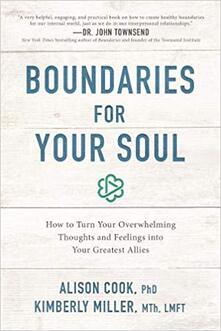|
Alison Cook spoke at my church mom’s group last year and brought with her copies of her newly published book Boundaries For Your Soul which she co-wrote with Kimberly Miller. The subtitle How to Turn Your Overwhelming Thoughts and Feelings into Your Greatest Allies caught my eye immediately, but the book sat on my bedside table for months before I picked it up this fall. It’s a handbook, not a novel, so I wanted to be in a non-drowsy, calm state of mind to absorb the instruction.
“Be strong and courageous. Do not be afraid...for the Lord your God goes with you.” (Deuteronomy 31:6)
Right, I reflected. Be strong and courageous. Do not be afraid. This is one of God’s most repeated messages to us in the Bible -- Fear not, for I am with you! I wrote about it here when I detailed the lessons of the Mother/Daughter Retreat I attended in the spring. I understood this message clearly, and I thought I was doing a good job resting in uncertainty. I presented a smiling face to friends. At times, I confided my anxieties and was calmed by a friend’s prayer. And yet, why did I get three new canker sores all at once, with more each week as the uncertainty continued? Why was I yelling at my kids more, especially when they asked me to buy things for them? Why was I stockpiling things for the winter -- like snowsuits and a new artificial Christmas tree -- just in case the money ran out? Why was I calling three different home repairmen in one week (carpenter, plumber, gutter guy) in order to fortify the homestead? Why did I bake up a storm and even briefly consider learning how to can applesauce? Why did I obsess over getting our appointments and flu shots squared away before the health insurance ran out? Why did I feel the need to remind my husband we don’t have to tithe if there is no income? Why? Why couldn’t I get a grip? I picked up Cook and Miller’s book because I realized I was overwhelmed by fear and didn’t know how to handle it. Cook and Miller recognize that we have different parts to our soul -- different ways to cope with overwhelming feelings, for example -- and that these parts don’t always work well together. The authors provide instructions for how to place boundaries around difficult parts of ourselves (the parts we might wish were different, like the part of me that wishes I could just handle the uncertainty) and appreciate how the parts are trying to work to our benefit. “The goal is not to eradicate parts of your soul carrying anger, fear, sadness, envy, or shame, but to lead them with curiosity and compassion.” (43) The authors devised a five step plan for how to examine the parts of the soul that are overwhelmed and how to bring those emotions before God. They call this “taking a You-turn.” The five steps of taking a You-turn: Step 1: Focus on an overwhelming part of yourself. (Describe it / picture it / recall past times of feeling this way.) Step 2: Befriend this part you don’t like. (Ask whether you feel curiosity or compassion towards this part of yourself, and if not, give yourself grace.) Step 3: Invite Jesus to draw near. (And if you can’t invite Jesus near, then why stops you? Listen to Jesus.) Step 4: Unburden this weary part. (What fears do you have about giving up this burden? What do you need in exchange for giving up this weary part?) Step 5: Integrate it into your internal team of rivals. (What new roles can these parts of you play?) Through the authors instruction, I was able to “learn to speak on behalf of the part” of me that was afraid, and to “speak kindly.” (55-6) I was able to understand fear’s place. Most importantly, I was able to invite Jesus to be near. I know in my mind that God is with me. I told myself I shouldn’t have to feel afraid. But thanks to that fear I made plans to spend more time with the family I was afraid to lose...and am now up-to-date on my tetanus shot...and I am able to better feel God’s presence in my life. Because there’s a difference between knowing God says “do not be afraid” and actually going to God and telling him, “I’m scared.” I learned to invite him to sit with me in that vulnerable state, and to feel his comfort and reassurance. “Our religious activities, or spiritual disciplines, on their own don’t change us -- they create an environment in which growth can occur.” (90) If you’ve struggled with parts of your soul that have overwhelmed you or that you have wanted to change, consider grabbing a copy of Cook and Miller’s book. Let it remind you that we are all “fearfully and wonderfully made.” (Psalm 139:14)
0 Comments
Leave a Reply. |
Author's Log
Here you will find a catalog of my writing and reflections. Archives
December 2022
|
